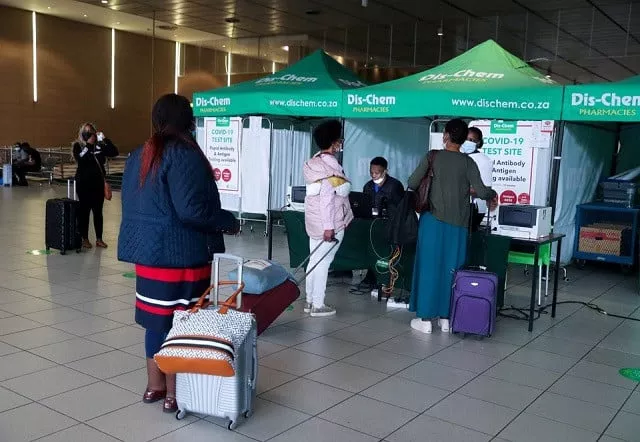Borders slam shut as world rushes to contain new Covid variant
Omicron variant has cast doubt on global efforts to fight the pandemic, forcing countries to re-impose measures
SYDNEY:World governments rushed to contain a new, heavily mutated Covid-19 strain on Sunday, with Israel slamming its borders shut to foreign nationals and Australia reporting its first cases of the variant.
The variant now known as Omicron has cast doubt on global efforts to fight the pandemic because of fears that it is highly infectious, forcing countries to re-impose measures many had hoped were a thing of the past.
Scientists are racing to determine the threat posed by the heavily mutated strain — particularly whether it can evade existing vaccines.
Several countries have also announced plans to restrict travel from southern Africa, where it was first detected, including key travel hub Qatar, the United States, Britain, Saudi Arabia, Kuwait and the Netherlands.
The strictest among them is Israel, which said on Sunday it would close its borders to all foreigners in a bid to curb the spread of the variant — just four weeks after reopening to tourists after a prolonged closure due to Covid.
"We are raising a red flag," Israeli Prime Minister Naftali Bennett said, adding the country would order 10 million PCR test kits to stem the "very dangerous" strain.
Israeli citizens will be required to present a negative PCR test and quarantine for three days if they have been vaccinated against the coronavirus and seven days if they have not, the prime minister's office said.
No entry
But the virus strain has already slipped through the net, and has now been found everywhere from the Netherlands to Hong Kong and Australia, where authorities on Sunday said they had detected it for the first time in two passengers from southern Africa who were tested after flying into Sydney.
The arrival of the new variant comes just a month after Australia lifted a ban on citizens travelling overseas without permission, with the country's border also set to open to skilled workers and international students by the year's end.
Both cases were fully vaccinated, authorities said, and landed the same day that Canberra announced a sweeping ban on flights from nine southern African countries, including South Africa and Zimbabwe.
The speed at which governments slammed their borders shut took many by surprise, with travellers thronging Johannesburg international airport, desperate to squeeze onto the last flights to countries that had imposed sudden travel bans.
In the Netherlands, 61 passengers tested positive after arriving on two flights from South Africa in an ordeal one passenger described as "Dystopia Central Airline Hallway".
New York Times global health reporter Stephanie Nolen said passengers, including babies and toddlers, were crammed together waiting to get tested, while "still 30 per cent of people are wearing no mask or only over mouth".
Blame game
Scientists in South Africa last week said that they had detected the new B.1.1.529 variant with at least 10 mutations, compared with three for Beta or two for Delta — the strain that hit the global recovery hard and sent millions worldwide back into lockdown.
The variant has also revived geopolitical fault lines exacerbated by the pandemic, with the US quick to hail South Africa's openness about the new strain — a thinly veiled jab at China's handling of information about the original outbreak.
But South Africa has complained it is being unfairly hit with "draconian" air travel bans for having first detected the strain, which the World Health Organisation has termed a "variant of concern".
"Excellent science should be applauded and not punished," its foreign ministry said in a statement.


COMMENTS
Comments are moderated and generally will be posted if they are on-topic and not abusive.
For more information, please see our Comments FAQ